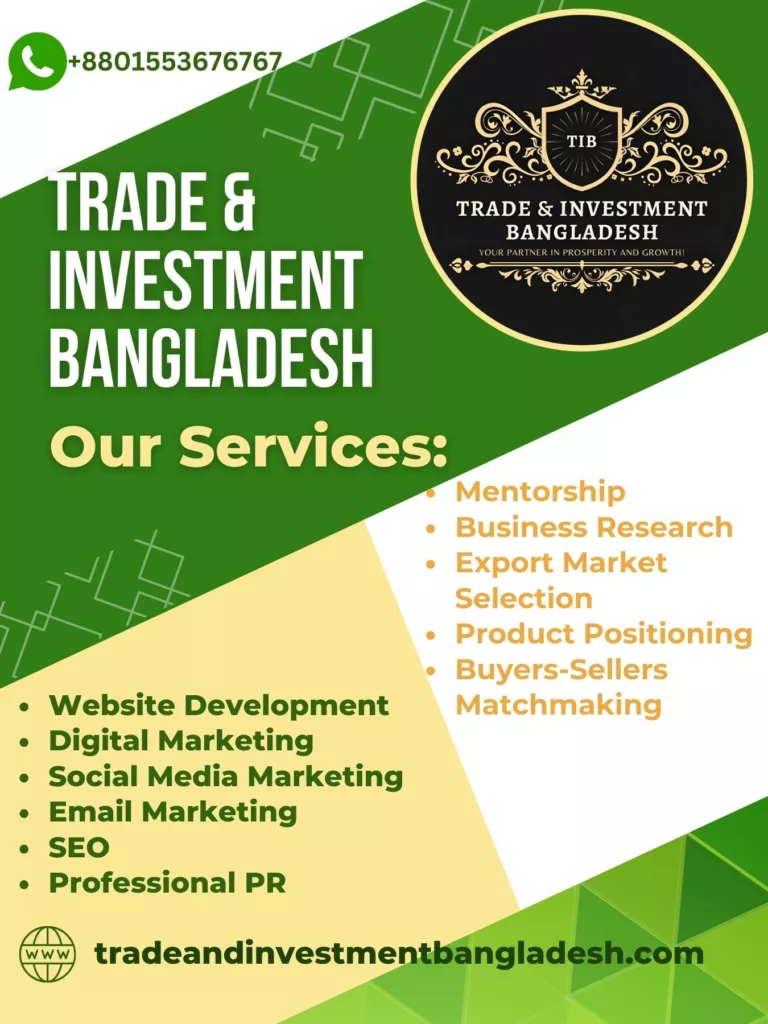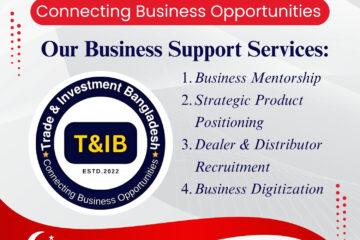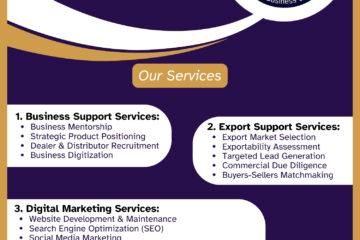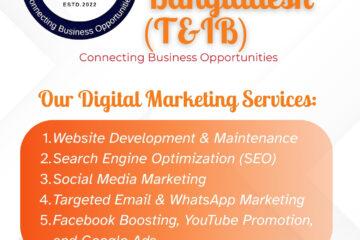The Art of Hiring a Top-Tier Business Consultant [P-1]
Md. Joynal Abdin, BBA (Hons.), MBA
Founder & CEO, Trade & Investment Bangladesh
In the ever-evolving landscape of business, success is not a solitary endeavor. It’s often the result of collaboration, innovation, and expert guidance. This is where a top-tier business consultant can make all the difference.
Whether you’re a seasoned entrepreneur seeking to revitalize your company or a startup founder navigating uncharted waters, the insight and experience of a skilled consultant can be the catalyst that propels your business to new heights. But here’s the thing: not all consultants are created equal. Finding the right one is an art, a craft that can significantly impact the trajectory of your organization.
In this blog post, we embark on a journey through “The Art of Hiring a Top-Tier Business Consultant.” We will explore the nuances of this crucial decision-making process, offering insights, strategies, and expert advice to help you make the best choice for your unique needs.
From understanding why hiring a consultant can be a game-changer to identifying the qualities that set top-tier consultants apart, we’ll equip you with the knowledge and tools to navigate the consultant hiring landscape with confidence. We’ll delve into the steps involved in the hiring process, from searching for candidates to conducting interviews and reference checks.
Moreover, we’ll illuminate the potential pitfalls to avoid and share tips on nurturing a productive and collaborative partnership with your chosen consultant. Finally, we’ll discuss how to measure the success of your consulting engagement and ensure that your investment yields tangible results.
Whether you’re on the cusp of your first consulting endeavor or looking to refine your approach to hiring consultants, this guide will serve as your compass in the art of selecting a top-tier business consultant. So, let’s embark on this transformative journey together, where your business aspirations meet the expertise that can turn them into reality.
Why Hire a Business Consultant:
Hiring a business consultant can be a strategic decision that offers numerous benefits to your organization. Here are several compelling reasons why you might consider bringing in a business consultant:
- Expertise and Specialization: Business consultants typically possess specialized knowledge and expertise in specific industries, functions, or areas of business, such as marketing, finance, operations, or technology. They bring insights and experience that you may not have in-house.
- Objective Perspective: Consultants provide an unbiased and objective viewpoint. They can evaluate your business’s strengths and weaknesses without personal or emotional attachments, helping you identify areas for improvement more clearly.
- Problem Solving: Consultants excel at problem-solving. They can analyze complex issues, develop effective strategies, and implement solutions to address challenges your business is facing, whether it’s declining sales, operational inefficiencies, or market entry strategies.
- Cost Efficiency: Hiring a consultant can be more cost-effective than hiring full-time employees, especially for short-term or specialized projects. You can access their expertise without the overhead costs of benefits, salaries, and long-term commitments.
- Time Savings: Consultants can accelerate the decision-making process and project implementation. They bring a wealth of experience and can often complete projects faster and with greater efficiency than internal teams.
- Fresh Perspectives and Innovation: Consultants often bring fresh ideas and innovative approaches to the table. They can challenge the status quo and introduce new strategies or technologies that can give your business a competitive edge.
- Access to Networks: Many consultants have extensive professional networks that can benefit your business. They can connect you with industry experts, potential clients, partners, or investors.
- Focus on Core Competencies: By outsourcing certain functions or projects to consultants, you can allow your internal teams to focus on their core competencies, leading to increased productivity and better overall performance.
- Flexibility: Consultants can be engaged on a project-by-project basis, making it easier to scale up or down as needed. This flexibility is especially valuable in dynamic business environments.
- Knowledge Transfer: A good consultant not only solves problems but also transfers knowledge to your team. This helps build internal capabilities and ensures that the benefits of the consultant’s work continue after their engagement ends.
- Risk Mitigation: Consultants can help you navigate risks and regulatory compliance issues. They can provide guidance on legal matters, industry standards, and best practices, reducing the likelihood of costly mistakes.
- Enhanced Decision-Making: Consultants provide data-driven insights and market analysis, empowering you to make informed decisions that align with your business goals and objectives.
In summary, hiring a business consultant can provide your organization with a valuable external perspective, specialized skills, and a cost-effective means to address various business challenges and opportunities. Whether you’re looking to optimize processes, launch a new product, or revitalize your business strategy, a consultant can be a strategic partner in achieving your goals.
Identifying Your Consulting Needs:
Identifying your consulting needs is a critical first step in the process of hiring a business consultant. To determine where and how a consultant can best assist your organization, consider the following steps:
- Assess Current Challenges: Begin by conducting a thorough assessment of your business. Identify the specific challenges, problems, or opportunities you’re facing. This could involve financial issues, operational inefficiencies, declining sales, strategic planning, market expansion, or technology upgrades.
- Set Clear Objectives: Clearly define what you hope to achieve with the assistance of a consultant. Your objectives should be specific, measurable, achievable, relevant, and time-bound (SMART). For example, you might aim to increase revenue by 20% within the next year or reduce production costs by 15%.
- Engage Stakeholders: Consult with key stakeholders within your organization, including executives, managers, and department heads. Gather their insights and perspectives on the challenges and opportunities at hand. This collaborative approach ensures that you consider various viewpoints.
- Prioritize Needs: Not all challenges are of equal importance or urgency. Prioritize your consulting needs based on their potential impact on your business and the resources available. Focus on addressing the most critical issues first.
- Conduct SWOT Analysis: Perform a SWOT (Strengths, Weaknesses, Opportunities, Threats) analysis to gain a comprehensive understanding of your business’s internal and external factors. This analysis can help you identify areas where a consultant’s expertise would be most beneficial.
- Review Industry Trends: Stay informed about industry trends, emerging technologies, and best practices. Consider how these trends might affect your business and where a consultant can help you adapt or capitalize on them.
- Analyze Competitors: Study your competitors to identify areas where they may have a competitive advantage. Determine if hiring a consultant can help you bridge those gaps or surpass your competitors in certain aspects of your business.
- Evaluate Internal Resources: Assess the skills and capabilities of your current workforce. Identify any skills gaps or areas where additional expertise is needed that could be provided by a consultant.
- Consider Long-Term vs. Short-Term Needs: Determine whether your consulting needs are short-term or long-term in nature. Some projects may require a consultant for a specific period, while others may involve ongoing support.
- Budget and Resource Allocation: Establish a budget for consulting services. Consider how much you’re willing to invest in consultant fees and allocate resources accordingly.
- Risk Assessment: Evaluate the risks associated with not addressing your identified needs. Consider the potential financial, operational, and strategic implications of inaction.
- Alignment with Business Goals: Ensure that your consulting needs align with your overall business goals and strategic objectives. Consultants should be seen as partners in achieving these goals.
By following these steps and conducting a thorough analysis, you’ll be well-equipped to identify and prioritize your consulting needs accurately. This clarity will not only help you select the right consultant but also set the stage for a successful consulting engagement that drives positive outcomes for your business.
The Qualities to Look For:
When hiring a business consultant, it’s crucial to look for specific qualities and attributes that set top-tier consultants apart. These qualities can significantly impact the success of your consulting engagement. Here are the key qualities to look for in a business consultant:
Expertise in Your Industry: A top-tier consultant should have deep industry knowledge and experience relevant to your business. They should understand industry trends, challenges, and best practices.
Proven Track Record: Look for a consultant with a strong track record of successful projects and satisfied clients. Request references and case studies to validate their achievements.
Adaptability: Business environments are dynamic, and consultants must be adaptable. They should be able to pivot when necessary and adjust their strategies to changing circumstances.
Strong Analytical Skills: Consultants should excel in analyzing complex problems, gathering data, and making data-driven decisions. They should be able to identify root causes and develop effective solutions.
Excellent Communication: Effective communication is paramount. Consultants should be able to explain their ideas and recommendations clearly and concisely, both in writing and verbally.
Collaborative Approach: A consultant should work collaboratively with your team, integrating their expertise with your organization’s culture and objectives. They should be open to feedback and willing to involve your team in the decision-making process.
Strategic Thinking: Look for a consultant who can think strategically, not just tactically. They should help you develop long-term strategies that align with your business goals.
Problem-Solving Skills: Consultants are hired to solve problems. They should demonstrate creativity and resourcefulness in finding innovative solutions to your specific challenges.
Project Management Abilities: Consultants often oversee complex projects. They should have strong project management skills, ensuring that projects are completed on time and within budget.
Ethical and Professional Conduct: Integrity is non-negotiable. Consultants should conduct themselves ethically, respecting confidentiality, and avoiding conflicts of interest.
Empathy and Listening Skills: Effective consultants listen carefully to your concerns, understand your business’s unique context, and empathize with your challenges.
Client-Centric Focus: Top-tier consultants prioritize your success above all else. They should be committed to delivering value and achieving the outcomes you seek.
Continuous Learning: The business landscape evolves rapidly. Look for consultants who invest in continuous learning and stay updated on industry trends and emerging technologies.
Global Perspective: If your business has global operations or ambitions, consider a consultant with international experience and a global perspective.
Confidence and Humility: A balance of confidence and humility is important. While consultants should be confident in their expertise, they should also acknowledge when they don’t have all the answers and seek input when necessary.
Results-Oriented: Ultimately, a top-tier consultant should be results-oriented. They should be committed to delivering tangible outcomes and measuring the impact of their work.
When evaluating potential consultants, assess how well they align with these qualities. It’s also essential to have in-depth discussions during the interview process to gauge their fit for your specific needs and organizational culture. By prioritizing these qualities, you increase your chances of selecting a consultant who can drive meaningful and sustainable improvements in your business.
Searching for Candidates:
Searching for the right candidates when hiring a business consultant is a critical step in the process. Here are several effective strategies for finding potential consultant candidates:
- Professional Networks: Leverage your professional network, including industry contacts, colleagues, and peers. They may recommend consultants they have worked with or have heard of through their own networks.
- Industry Associations: Explore industry-specific associations, forums, and events. These platforms often have directories of consultants and resources for finding qualified professionals in your industry.
- Online Platforms: Utilize online platforms and directories tailored to consulting services. Websites like LinkedIn, Upwork, and Glassdoor allow you to search for consultants based on their expertise, reviews, and recommendations.
- Consulting Firms: Consider reaching out to consulting firms that specialize in your industry or the specific type of consulting you need. These firms often have a roster of experienced consultants.
- Business Directories: Search local and national business directories, both online and offline. These directories may list consultants along with their contact information and areas of expertise.
- Business Conferences and Seminars: Attend industry conferences, seminars, and workshops. These events are excellent opportunities to network with consultants who may be presenting or attending.
- Referrals: Ask for referrals from colleagues, partners, or other businesses that have engaged consultants in the past. Personal recommendations can be invaluable.
- Online Research: Conduct online research by entering relevant keywords related to your consulting needs into search engines. This may lead you to consultant websites, articles, or directories.
- Professional Organizations: Investigate professional organizations related to the specific expertise you require. Many consultants are members of such organizations, making it easier to find qualified candidates.
- Local Business Associations: Check with local business associations or chambers of commerce. They often have resources for finding consultants who operate in your geographic area.
- Social Media: Explore social media platforms, such as Twitter and Facebook, where consultants often share their expertise and engage with clients. You can use hashtags and groups to narrow your search.
- Consultant Databases: Some universities, business schools, or industry-specific organizations maintain databases of consultants and experts. These can be valuable sources for candidate leads.
- Consultant Directories: Look for directories specifically designed for consulting services. These directories may provide detailed profiles of consultants, including their areas of specialization and contact information.
- Online Reviews and Testimonials: Read online reviews and testimonials from previous clients who have worked with consultants. These can help you identify consultants with a strong track record.
- Freelancing Platforms: Platforms like Freelancer, Toptal, and Guru offer access to a wide range of freelance consultants. You can post your project and invite consultants to bid.
- Recruitment Agencies: Consider working with specialized recruitment agencies that focus on sourcing consultants. They can help you identify candidates who match your requirements.
Once you’ve identified potential consultant candidates through these strategies, you can further evaluate them based on their qualifications, experience, and suitability for your project or business needs. The goal is to compile a list of promising candidates to move forward with the selection process.
Evaluating Consultant Profiles:
Evaluating consultant profiles is a crucial step in the process of hiring a business consultant. To identify the right candidate for your needs, consider the following steps when reviewing consultant profiles:
- Review Qualifications and Education: Start by examining the consultant’s qualifications and educational background. Look for relevant degrees, certifications, and professional memberships related to their field of expertise.
- Assess Industry Experience: Determine the extent of the consultant’s industry experience. Consider how many years they have worked in your specific industry and whether they have experience with businesses of similar size and complexity.
- Examine Track Record: Investigate the consultant’s track record and past projects. Review case studies, client testimonials, and project outcomes to gauge their ability to deliver results.
- Specializations and Expertise: Pay attention to the consultant’s areas of specialization and expertise. Ensure that their skills align with your consulting needs, whether it’s strategy, marketing, finance, operations, or another area.
- Client Portfolio: Look for information on the types of clients the consultant has worked with. Are there businesses similar to yours in their portfolio? This can be an indicator of their ability to understand your industry.
- Consulting Approach: Understand the consultant’s approach to consulting. Do they emphasize collaboration with clients? Are they known for their problem-solving skills and innovative thinking? Ensure their approach aligns with your expectations.
- References and Recommendations: Request and contact references from previous clients. Ask about their experiences working with the consultant, the results achieved, and whether they would recommend them.
- Communication Skills: Evaluate the consultant’s communication skills. Effective communication is essential for conveying ideas, strategies, and recommendations clearly to your team.
- Availability and Workload: Inquire about the consultant’s availability and workload. Ensure they can commit the necessary time and attention to your project and meet your project timelines.
- Fees and Cost Structure: Understand the consultant’s fee structure and pricing model. Is it aligned with your budget? Are there any hidden costs or expenses to consider?
- Conflict of Interest: Determine if the consultant has any potential conflicts of interest with your organization, such as existing clients or business affiliations that may pose a conflict.
- Cultural Fit: Assess whether the consultant is a cultural fit for your organization. Consider their working style, values, and whether they will integrate seamlessly with your team.
- Innovative Thinking: Look for evidence of innovative thinking in the consultant’s past work. Consultants who can offer creative solutions to complex problems can provide significant value.
- Problem-Solving Approach: Consider how the consultant approaches problem-solving. Are they thorough in their analysis? Do they have a structured problem-solving methodology?
- Technology and Tools: If relevant, check if the consultant is proficient in using the latest technologies and tools that can benefit your business.
- Accessibility and Communication: Ensure that the consultant is accessible for regular updates and discussions throughout the consulting engagement. Clear and open communication is key to a successful partnership.
- Personality and Work Style: Assess whether the consultant’s personality and work style align with your team’s culture and preferences. A good personality fit can lead to smoother collaboration.
By thoroughly evaluating consultant profiles using these criteria, you can make an informed decision when selecting the right consultant for your business. Remember to conduct interviews and have in-depth discussions with potential candidates to further assess their suitability and ensure a successful consulting partnership.
To read 2nd part of this article, click here
The Art of Hiring a Top-Tier Business Consultant [P-1]: The Art of Hiring a Top-Tier Business Consultant [P-1] : The Art of Hiring a Top-Tier Business Consultant [P-1]
Developing Bangladesh Trade & Investment Bangladesh Bangladesh Trade Center Read More
![The Art of Hiring a Top-Tier Business Consultant [P-1]](https://mdjoynalabdin.com/wp-content/uploads/2023/07/Business-Consultant-Digital-Marketer-1024x576.webp)




0 Comments